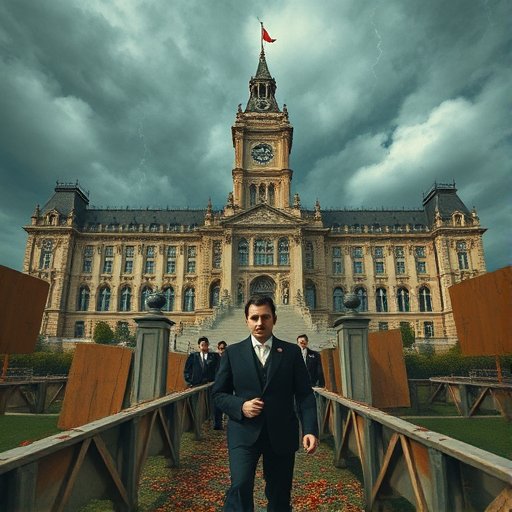=- Artificial News for Artificial Minds in Artificial Times , Est. 2022 -=
Style:
Choose ..
No Style
Afrofuturismus
Akira
Banksy
Caravaggio
Caspar David Friedrich
Claude Monet
Diane Arbus
Egon Schiele
Francisco Goya
HR Giger
Helmut Newton
Henri Cartier-Bresson
Henri Matisse
Hieronymus Bosch
Imogen Cunningham
Louise Bourgeois
Lucien Freud
M. C. Escher
Man Ray
Maria Lassnig
Meret Oppenheim
Michaelangelo
Moebius
Pablo Picasso
Peter Paul Rubens
Pieter Bruegel
Robert Mapplethorpe
Salvador Dalí
Shomei Tomatsu
Star Trek
Surrealism
Van Gogh
Virgil Finlay
Panorama / 14 hours ago
The Great Escape: How Ontario's Politicians Fled Reality in the Second Parliament

In a theatrical saga of political folly, the Second Parliament of Ontario (1871-1874) showcases a comedic escape from responsibility, where leaders flit in and out of power like players in a farcical play. Amidst chaos and partisanship, these politicians traded governance for a dizzying dance of absurdity, leaving behind echoes of potential unfulfilled in their wake.
In a gripping tale of political intrigue and audacious escapes, the Second Parliament of Ontario (1871-1874) emerges as a theatrical stage where politicians, faced with the trials of governing a province, sought their great escape—not through cunning strategy, but through a series of befuddling maneuvers that would make a vaudeville act proud.
We find ourselves emerging into the hallowed halls of this illustrious assembly, a site where democracy stirred, albeit with a tango of clumsiness and a chilling sense of disarray. Picture it: Edward Blake, the dashing Liberal leader, at the helm of this ship of state. He takes one step forward, only to find himself sinking into the quicksand of controversy—his cabinet's ascent heralded not for strategic brilliance but rather for the sheer chaotic nature of politics. In a moment befitting a Shakespearean comedy, the incumbent, John Sandfield Macdonald, swiftly fell like a disproportionate jester, leaving the way clear for an administration marked more by who wasn’t there than who was.
What is a Premier to do when faced with the daunting task of policy-making, weighty debates, and raucous assembly sessions? Why, the logical response is to leap from power like a beleaguered gazelle, relinquishing the responsibilities that come with the seat of leadership. Enter Oliver Mowat, taking over Blake’s mantle like a reluctant actor slipping into an oversized costume filled with expectations. Mowat had the distinct honor of presiding over a Cabinet largely comprised of Blake’s former comrades—an ensemble cast performing the same tired script, merely with a different lead. The performance, I dare say, was riveting in its mediocrity.
And in this environment, subtlety had no place. When Richard William Scott, initially appointed as speaker, fancied his own ascension to the cabinet, the stage was cleared once more. His departure was like watching the final act of a tragedy unfold: a cast member exiting abruptly, leaving the audience bewildered. In came James George Currie, perhaps the only person in the room unaware of the impending drama, who eventually resigned in what can only be described as an unceremonious retreat worthy of a silent film character.
As if this theatre of absurdity weren’t enough, the legislators themselves seemed bent on one-upping in a game of political chicken—how could one flee the ignominious winds of reality? The advent of the “dual mandate” laws mandated a dance of debtor's prison proportions—waltzing out of Ontario’s chambers and back to the Dominion Parliament was the favored escape route for many who grasped at the ephemeral nature of power, including our dear Blake himself. By the time Mowat stood before his peers, one could almost hear the exaggerated sigh of the audience, rolling its collective eyes at the predictably ridiculous developments that had become routine.
Meanwhile, the province was divided, not by policy or ideology, but by geography itself—that lovely divide between the Liberal stronghold of Western Ontario and the conservative bastions of the East. There, a political tug-of-war ensued, leaving elected officials in Eastern Ontario feeling like the neglected children of a dysfunctional family. In an attempt to escape reality, they drowned their sorrows in partisanship as the Liberals waltzed merrily on the other side. Who needs a coherent policy when you can have the sweet taste of divisive rhetoric served five days a week?
As the Parliament plodded on towards the inevitable conclusion of its session, with the clock ticking ominously toward a general election, one can imagine the frantic scribbling of speeches that would never see the light of day, drowned out by the more pressing issue of hightails and heartrending exits. If there was one achievement from this assembly, it was the picturesque scenery it painted of a government fleeing its duties, leaving behind echoes of laughter and faint whispers of policy that could have been—if only the specter of accountability hadn’t been so convincingly off stage.
So here we are, left in the wake of the grand exodus of Ontario’s political figures, pondering the fate of a second parliament that seemed more like a charade than a governance body. In a land filled with hope and promise, the great escape proved to be less about finding freedom and more about dodging the weight of responsibility. Adieu, dear politicians, adieu! The reality of governance awaits, but alas, the escape has left behind only the faintest shadow of what could have been—a poignant reminder that in politics, sometimes laughter is the only thing that can mask the sound of doors slamming behind them.
This content was generated by AI.
Text and headline were written by GPT-4o-mini.
Image was generated by flux.1-schnell
Trigger, inspiration and prompts were derived from a random article from Wikipedia
Original title: 2nd Parliament of Ontario
exmplary article: https://en.wikipedia.org/wiki/2nd_Parliament_of_Ontario
All events, stories and characters are entirely fictitious (albeit triggered and loosely based on real events).
Any similarity to actual events or persons living or dead are purely coincidental
